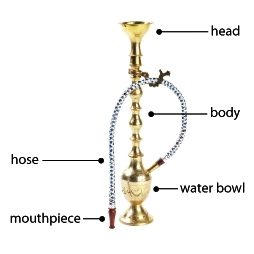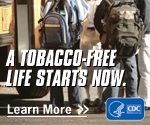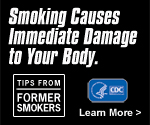Hookahs
Overview
- Hookahs—sometimes called water pipes—are used to smoke specially made tobacco that is available in a variety of flavors (e.g., apple, mint, cherry, chocolate, coconut, licorice, cappuccino, and watermelon).1,2
- Hookah smoking is typically practiced in groups, with the same mouthpiece passed from person to person.1,2
- Hookahs originated in ancient Persia and India and have been used extensively for centuries.1,2,3 Today, hookah cafés are gaining popularity around the globe, including Britain, France, Russia, the Middle East, and the United States.1 An estimated 300 hookah cafés operated in the United States in 2006, and the numbers continue to grow.1 In recent years, there has been a increase in hookah use around the world, most notably among youth.1,2,3

- Hookah is known by a number of different names, including narghile, argileh, shisha, hubble-bubble, and goza.1,2
- Hookahs vary in size, shape, and composition.2
- A typical modern hookah comprises a head (with holes in the bottom), a metal body, a water bowl, and a flexible hose with a mouthpiece.4
Compared with Cigarettes
While many hookah smokers may consider this practice less harmful than smoking cigarettes, hookah smoking carries many of the same health risks as cigarettes.1,2
- Water pipe smoking delivers the addictive drug nicotine and is at least as toxic as cigarette smoke.2
- Due to the mode of smoking—including frequency of puffing, depth of inhalation, and length of the smoking session—hookah smokers may absorb higher concentrations of the toxins found in cigarette smoke.1,2
- A typical 1-hour-long hookah smoking session involves inhaling 100–200 times the volume of smoke inhaled from a single cigarette.4
- Hookah smokers are at risk for the same kinds of diseases as are caused by cigarette smoking, including oral cancer, lung cancer, stomach cancer, cancer of the esophagus, reduced lung function, and decreased fertility.5
Hookah smoking is NOT a safe alternative to smoking cigarettes.1
Health Effects
Hookah Smoke and Cancer
- The charcoal used to heat tobacco in the hookah increases the health risks by producing high levels of carbon monoxide, metals, and cancer-causing chemicals.1,4
- Even after it has passed through water, the smoke produced by a hookah contains high levels of toxic compounds, including carbon monoxide, heavy metals, and cancer-causing chemicals.4
- Hookah tobacco and smoke contain numerous toxic substances known to cause lung, bladder, and oral cancers.1,4
- Irritation from exposure to tobacco juices increases the risk of developing oral cancers. The irritation by tobacco juice products is likely to be greater among hookah smokers than among pipe or cigar smokers because hookah smoking is typically practiced (with or without inhalation) more often and for longer periods of time.6
Other Health Effects of Hookah Smoke
- Hookah tobacco and smoke contain numerous toxic substances known to cause clogged arteries and heart disease.1,4
- Infectious diseases may be transmitted by sharing a hookah.2
- Babies born to women who smoked one or more water pipes a day during pregnancy have lower birth weights (were at least 3½ ounces less) than babies born to nonsmokers and are at an increased risk for respiratory diseases.5
Hookahs and Secondhand Smoke
- Secondhand smoke from hookahs poses a serious risk for nonsmokers, particularly because it contains smoke not only from the tobacco but also from the heat source (e.g., charcoal) used in the hookah.1,4
Using a hookah to smoke tobacco poses a serious potential health hazard to smokers and others exposed to the smoke emitted.1,4
References
- American Lung Association.
An Emerging Deadly Trend: Waterpipe Tobacco Use
 .
(PDF–222 KB) Washington: American Lung Association, 2007 [accessed 2011 Feb 15].
.
(PDF–222 KB) Washington: American Lung Association, 2007 [accessed 2011 Feb 15]. -
The Effects of Waterpipe Tobacco Smoking on Health Outcomes: A Systematic Review
 .
International Journal of Epidemiology 2010;39:834–857 [accessed 2011 Aug 18].
.
International Journal of Epidemiology 2010;39:834–857 [accessed 2011 Aug 18]. - Centers for Disease Control and Prevention.
Tobacco Use Among Students Aged 13–15 Years—Baghdad, Iraq, 2008
 . Morbidity and Mortality Weekly Report 2009;58(12):305–8 [accessed 2011 Feb 15].
. Morbidity and Mortality Weekly Report 2009;58(12):305–8 [accessed 2011 Feb 15]. - World Health Organization. Tobacco Regulation Advisory Note.
Water Pipe Tobacco Smoking: Health Effects, Research Needs and Recommended Actions by Regulators
 .
(PDF–550 KB) Geneva: World Health Organization, Tobacco Free Initiative, 2005 [accessed 2011 Feb 15].
.
(PDF–550 KB) Geneva: World Health Organization, Tobacco Free Initiative, 2005 [accessed 2011 Feb 15]. - Nuwayhid, I, Yamout, B., Ghassan, and Kambria, M.
Narghile (Hubble-Bubble) Smoking, Low Birth Weight and Other
Pregnancy Outcomes
 . American Journal of Epidemiology
1998;148:375–83 [accessed 2011 Feb 15].
. American Journal of Epidemiology
1998;148:375–83 [accessed 2011 Feb 15]. - Squamous Cell Carcinoma and Keratoacanthoma of the Lower Lips associated with "Goza" and "Shisha" Smoking. International Journal of Dermatology 1999;38:108-10 [cited 2011 Feb 15].
For Further Information
Centers for Disease Control and Prevention
National Center for Chronic Disease Prevention and Health Promotion
Office on Smoking and Health
E-mail: tobaccoinfo@cdc.gov
Phone: 1-800-CDC-INFO
Media Inquiries: Contact CDC's Office on Smoking and Health press line at 770-488-5493.
File Formats: All viewers, players, and plug-ins used on this site can be downloaded from the file formats page. (For example: Adobe Acrobat Reader for pdf files, Windows Media Player for audio and video files, PowerPoint Viewer for presentation slides, etc.)
Contact Us:
- CDC/Office on Smoking and Health
4770 Buford Highway
MS K-50
Atlanta, Georgia 30341-3717 - 800-CDC-INFO
(800-232-4636)
TTY: (888) 232-6348
8am–8pm ET
Monday–Friday
Closed Holidays - tobaccoinfo@cdc.gov





